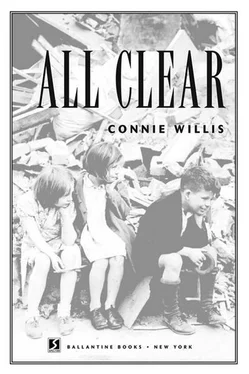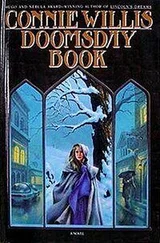Connie Willis - All Clear
Здесь есть возможность читать онлайн «Connie Willis - All Clear» весь текст электронной книги совершенно бесплатно (целиком полную версию без сокращений). В некоторых случаях можно слушать аудио, скачать через торрент в формате fb2 и присутствует краткое содержание. Жанр: Старинная литература, на английском языке. Описание произведения, (предисловие) а так же отзывы посетителей доступны на портале библиотеки ЛибКат.
- Название:All Clear
- Автор:
- Жанр:
- Год:неизвестен
- ISBN:нет данных
- Рейтинг книги:5 / 5. Голосов: 1
-
Избранное:Добавить в избранное
- Отзывы:
-
Ваша оценка:
- 100
- 1
- 2
- 3
- 4
- 5
All Clear: краткое содержание, описание и аннотация
Предлагаем к чтению аннотацию, описание, краткое содержание или предисловие (зависит от того, что написал сам автор книги «All Clear»). Если вы не нашли необходимую информацию о книге — напишите в комментариях, мы постараемся отыскать её.
All Clear — читать онлайн бесплатно полную книгу (весь текст) целиком
Ниже представлен текст книги, разбитый по страницам. Система сохранения места последней прочитанной страницы, позволяет с удобством читать онлайн бесплатно книгу «All Clear», без необходимости каждый раз заново искать на чём Вы остановились. Поставьте закладку, и сможете в любой момент перейти на страницу, на которой закончили чтение.
Интервал:
Закладка:
Alf appeared beside her. “Did somethin’ ’appen to Eileen?” he asked.
Mr. Dunworthy made an effort to speak, but nothing came out. He took another step forward, to where Polly could see his face. He looked stunned, his face ashen.
No, she thought, not Eileen. It can’t be. Mr. Dunworthy and I are the ones with the deadlines. Eileen survived the war. She—
Binnie, trailing bedclothes, pushed past Polly. “Where’s Eileen?” she demanded, her voice rising. “Did sumthin’ ’appen to ’er?”
Mr. Dunworthy shook his head.
Thank God.
“Are you all right?” Polly called to him.
“I was at St. Paul’s …” he said, looking up at her and then back toward the doorway he’d come through.
A young man was standing in it. He started down the aisle, and Polly saw he had an ARP warden’s armband and a helmet, which he’d taken off and was holding in both hands. Oh, God, she thought. It’s Stephen.
But it couldn’t be. Stephen hadn’t even met her yet. He wouldn’t meet her till 1944. And the warden’s hair was reddish blonde, not dark. “Polly,” he said.
“Sir Godfrey!” Trot shouted into the wings. “The carpenter’s here!”
“It ain’t the carpenter, you noddlehead!” Alf shouted at her. “It’s an air-raid warden.”
No, it isn’t, Polly thought.
It wasn’t Stephen either, and the sword that Polly had been holding all this time, that she hadn’t realized she was still holding, fell from her nerveless fingers.
It was Colin.
Trying to unweave, unwind, unravel,
And piece together the past and the future
—T.S. ELIOT, FOUR QUARTETS
Imperial War Museum, London—7 May 1995
COLIN SAT THERE IN THE SHELTER REPLICA WITH BINNIE, not hearing the siren sound effects, not seeing the red flashes, not doing anything but attempting to take in what Binnie had just told him. Eileen was dead. She’d died eight years ago. Which meant Polly had died in December 1943.
There was a poster on the wall behind Binnie with a picture of a housewife, a nurse, and an ARP warden on it. You Can Win the Battle, it read.
I didn’t win it, he thought numbly. I was too late. Eileen’s been dead nearly a decade. I wasn’t able to rescue her. Or Polly.
“I’m so sorry,” Binnie said. “I should have told you that first thing. It was a cancer.”
A cancer which could have been cured easily if Eileen had been home in Oxford where she belonged. Which they still might be able to cure if he could go back and get her out in time. If she had been alone when she died, he might still be able to …
“Did she die in hospital?” he asked urgently. “Was anyone with her?”
Binnie looked at him, frowning. “Of course. All of us were.”
Which meant there was no way to rescue her at the last moment, no way to whisk her off in a stolen ambulance and send her back through. He sank back down on the bench beside Binnie and put his head in his hands.
“We all got to tell her goodbye,” Binnie said. “The end was very peaceful.”
Peaceful, he thought bitterly. Dying stranded in the past like Polly before her, waiting in vain for rescue. Only Eileen must surely have given up waiting, given up hoping, years before. “I’m so sorry.”
“It’s a pity,” she said, nodding. “She would have loved to see you again. But at least we found you.” She beamed at him. “When you didn’t find Mum, we were afraid something had gone wrong. Or at least I was. But Alf said we had to have found you, because if we hadn’t, you couldn’t have come to fetch Polly and—”
“Fetch—?” He grabbed her by the shoulders. “What are you talking about?”
“Your coming to take them back through the drop.”
“But you just said I wasn’t able to find Eileen.”
“I didn’t say that,” she replied, surprised. “I meant you didn’t find her now, not then.”
“I found Eileen and Polly?”
She nodded. “And Mr. Dunworthy.”
“Mr. Dunworthy? He’s alive?”
Binnie nodded. “Polly found him at St. Paul’s.”
“He’s alive,” Colin murmured, unable to take it all in. “I thought he was dead. His death notice was in the newspapers.”
“No, he was only injured.”
“And I was able to come through to get them out?” he asked.
She nodded.
But if he had succeeded, Eileen wouldn’t still have been here. She wouldn’t have died still trying to find him. “What happened?” he asked, but he already knew the answer. “I came too late to be able to get them out, didn’t I?”
Journeys end in lovers meeting.
—WILLIAM SHAKESPEARE, TWELFTH NIGHT
London—19 April 1941
POLLY’S SWORD HIT THE STAGE WITH A CLATTER. “YOU’RE gonna catch it now!” Alf said, but she didn’t hear him.
“Colin,” she tried to say, but no sound came out. She glanced over at Mr. Dunworthy, who still stood there gripping the theater-seat back for support, and then back at Colin.
Though it wasn’t the Colin she’d known. There was nothing of the eager, high-spirited boy who’d followed her around Oxford like a puppy, who’d told her he intended to marry her when he grew up, in the man standing there in the aisle before her with his ARP helmet in his hands.
But it didn’t matter. Polly had known the moment she saw him standing there in the aisle that it was Colin. And that he had come, just as he had promised he would, to rescue her. But at what cost? He looked not only older but sadder, grimmer, his face lined with suffering and fatigue.
Oh, Colin, she thought, what’s happened to you since I saw you seven months ago?
But she knew that, too. He had spent weeks, months, years, frantically trying to get to them—trying to get the drops, any drop, to open. And then, when he’d failed, trying to puzzle out what had happened, trying to follow a trail which had gone cold.
I have ridden long, weary miles, she thought. I have searched long, hopeless years. And fought battles and spells and brambles and time. And found her.
Found all of them. She looked at Mr. Dunworthy, hanging on to the back of the theater seat for dear life, as though he still couldn’t believe what had happened. He looked like the Admirable Crichton and Lady Mary must have looked when the ship had finally arrived.
“They’ve reconciled themselves to living out their remaining lives and dying on the island,” Sir Godfrey had said when they were rehearsing the rescue scene. “And now rescue is at hand. No, no, no! No smiles! I want staggered, stunned, unable to believe they have been saved. Joyous and sad and afraid, all at once.”
And silent, Polly thought, as if we’re under a spell.
Colin was under it, too. He hadn’t moved, hadn’t spoken. He stood there perfectly still, with his ARP helmet in his hands, looking at her, waiting.
For me to break the spell, she thought.
“Oh, Colin,” she said, and came down the steps into the theater and up the aisle to where he stood. “You said you’d come rescue me if I got into trouble. And here you are!”
“Here I am,” he said, and his voice was changed, too. It was both rougher and gentler than the boy Colin’s—a man’s voice. “Rather late, I’m afraid, and somewhat the worse for wear.” He grinned at her, and she had been wrong. It was exactly the same Colin who had followed her into the Bodleian that day. He hadn’t changed at all.
Her heart caught. “You’re not late. You’re exactly on time.”
He started toward her, and she was suddenly breathing hard, as if she had been running. “Colin—”
“Polly!” Alf shouted from the stage. “Is the warden ’ere to evacuate us?” He pointed at Colin, who had stopped only a step away from her.
“Course ’e ain’t, you puddinghead,” Binnie said, coming out to the edge of the stage beside Alf. “Air-raid wardens don’t evacuate people.”
Читать дальшеИнтервал:
Закладка:
Похожие книги на «All Clear»
Представляем Вашему вниманию похожие книги на «All Clear» списком для выбора. Мы отобрали схожую по названию и смыслу литературу в надежде предоставить читателям больше вариантов отыскать новые, интересные, ещё непрочитанные произведения.
Обсуждение, отзывы о книге «All Clear» и просто собственные мнения читателей. Оставьте ваши комментарии, напишите, что Вы думаете о произведении, его смысле или главных героях. Укажите что конкретно понравилось, а что нет, и почему Вы так считаете.












